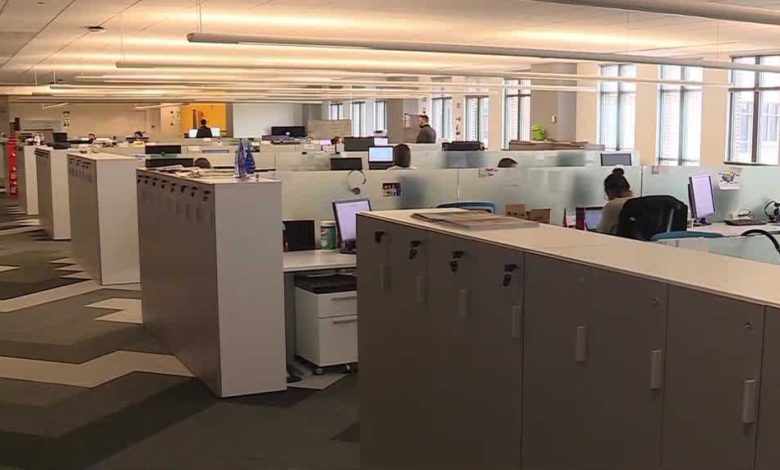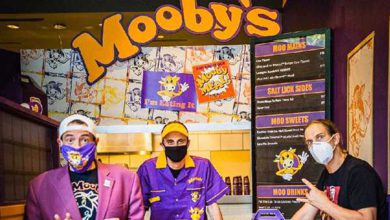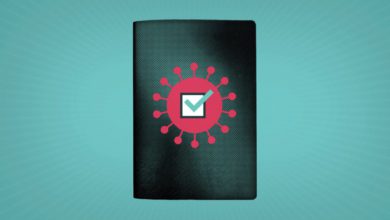

It's been 15 long months since millions of workers left their offices and set up makeshift desks at home.But as COVID-19 cases decline and more Americans get vaccinated, companies are beginning to establish protocols about how, and whether, office life will resume.For Wall Street banks, the growing consensus is that everyone ought to be back at their desks by Labor Day — though Citibank said it's embracing more of a hybrid model. Meanwhile, tech companies are taking a far more flexible approach.As for workers themselves, more than half of those surveyed in a recent Pew Research Center survey said that, given the choice, they would want to keep working from home even after the pandemic subsides.Here's how some of the biggest names in tech and finance are handling the return to office life.AppleApple expects employees to return to their offices three days a week come September, CEO Tim Cook wrote in an email to employees earlier this month, according to The Verge."For all that we've been able to achieve while many of us have been separated, the truth is that there has been something essential missing from this past year: each other," Cook said in the email. "Video conference calling has narrowed the distance between us, to be sure, but there are things it simply cannot replicate."Employees are expected to be in the office Mondays, Tuesdays and Thursdays, but those with roles that allow for remote work will have the option to work from home Wednesdays and Fridays. The company is also offering up to two weeks of remote work annually and encouraging, but not requiring, vaccination.FacebookFacebook announced earlier this month that employees can apply for remote work if their role allows. Any worker who wants to return to the office may do so on a flexible basis but is encouraged to spend at least half of their time in the office. Employees will also be granted 20 days each year to work from a remote location.Facebook CEO Mark Zuckerberg told employees in a memo that he plans to continue working remotely for at least half of the next year, a company spokesperson confirmed to CNN Business.GoogleUntil September, Google workers around the world can continue to work remotely before deciding between coming back to their office, working out of a different Google office or applying for full-time remote work."The future of work is flexibility," CEO Sundar Pichai wrote in a May memo to employees.Pichai said he expects about 60% of employees to return to their pre-pandemic offices while 20% move to a different office and 20% work from home.TwitterTwitter has yet to set an exact start date for welcoming employees back to the office, but it plans to start with a 20% capacity limit.Early in the pandemic, the company said it plans to let some of its workforce continue working remotely "forever" if they choose."If our employees are in a role and situation that enables them to work from home and they want to continue to do so forever, we will make that happen," said Twitter's vice president of people, Jennifer Christie, in a statement to CNN Business. "If not, our offices will be their warm and welcoming selves, with some additional precautions, when we feel it's safe to return."The company has stressed that it wants employees to have the choice to return to the office, but it anticipates that most workers will opt for a hybrid model, spending some time in the office and some time at home.UberUber will shift to a hybrid model in September, according to an April blog post from Nikki Krishnamurthy, the company's chief people officer.Employees at the ride-hailing company are expected in the office three days a week, but they will have the option to work remotely the other two days."We feel that this combination of in-person and remote work will give people the freedom to do their best work while staying connected to their colleagues," Krishnamurthy said in the blog post.Bank of AmericaBank of America is encouraging, and expecting, all vaccinated employees to return to the office after Labor Day, CEO Brian Moynihan said this week."Our view is all the vaccinated teammates will be back," Moynihan said in a Bloomberg Television interview this week. "We'll be able to operate fairly normally and will then start to make provisions for the other teammates as we move through the fall."The bank is not mandating employees to report their vaccination status, but it is expecting them to input their status in the company portal.CitibankCiti said in March that it recognized how people have benefited from aspects of working remotely, and that it would embrace some flexibility in the return-to-office process.The bank said it expects up to 30% of U.S. staff to return to the office in July. The majority of Citi workers globally will be designated as "hybrid," working in the office at least three days a week and from home up to two days per week.Goldman SachsGoldman Sachs welcomed employees back to the office on Monday. The company is expecting 5,400 newly hired interns, analysts and associates in the office in addition to its returning employees."We are focused on progressing on our journey to gradually bring our people back together again, where it is safe to do so, and are now in a position to activate the next steps in our return to office strategy," the bank's leadership wrote in a May staff memo.Leading up to the return to in-person work, Goldman Sachs also mandated that its employees report their vaccination status. While vaccination is not required, the company is encouraging all staff to get vaccinated if possible.JPMorgan ChaseLast month, JPMorgan opened all of its U.S. offices to employees with a 50% occupancy cap. Executives at the bank informed staff that it expects all U.S.-based employees back in the office by early July on a consistent rotational schedule, subject to the same 50% cap."We firmly believe that working together in person is important for our culture, clients, businesses and teams," JPMorgan executives said.Morgan StanleyMorgan Stanley CEO James Gorman took a hard line earlier this week, saying he expects the bank's New York employees back in the office by Labor Day."If you can go to a restaurant in New York City, you can come into the office. And we want you in the office," Gorman said at an investing conference.The company has not mandated vaccination, but Gorman noted that "well over 90%" of employees had already received their COVID-19 vaccination. That number is expected to hit 98% to 99%, according to Gorman.The bank will continue to consider returning to the office on a case-by-case basis, Gorman said, recognizing that some employees may not be able to be vaccinated, or may be in a different situation if their office is outside of New York.
It's been 15 long months since millions of workers left their offices and set up makeshift desks at home.
But as COVID-19 cases decline and more Americans get vaccinated, companies are beginning to establish protocols about how, and whether, office life will resume.
For Wall Street banks, the growing consensus is that everyone ought to be back at their desks by Labor Day — though Citibank said it's embracing more of a hybrid model. Meanwhile, tech companies are taking a far more flexible approach.
As for workers themselves, more than half of those surveyed in a recent Pew Research Center survey said that, given the choice, they would want to keep working from home even after the pandemic subsides.
Here's how some of the biggest names in tech and finance are handling the return to office life.
Apple
Apple expects employees to return to their offices three days a week come September, CEO Tim Cook wrote in an email to employees earlier this month, according to The Verge.
"For all that we've been able to achieve while many of us have been separated, the truth is that there has been something essential missing from this past year: each other," Cook said in the email. "Video conference calling has narrowed the distance between us, to be sure, but there are things it simply cannot replicate."
Employees are expected to be in the office Mondays, Tuesdays and Thursdays, but those with roles that allow for remote work will have the option to work from home Wednesdays and Fridays. The company is also offering up to two weeks of remote work annually and encouraging, but not requiring, vaccination.
Facebook announced earlier this month that employees can apply for remote work if their role allows. Any worker who wants to return to the office may do so on a flexible basis but is encouraged to spend at least half of their time in the office. Employees will also be granted 20 days each year to work from a remote location.
Facebook CEO Mark Zuckerberg told employees in a memo that he plans to continue working remotely for at least half of the next year, a company spokesperson confirmed to CNN Business.
Until September, Google workers around the world can continue to work remotely before deciding between coming back to their office, working out of a different Google office or applying for full-time remote work.
"The future of work is flexibility," CEO Sundar Pichai wrote in a May memo to employees.
Pichai said he expects about 60% of employees to return to their pre-pandemic offices while 20% move to a different office and 20% work from home.
Twitter has yet to set an exact start date for welcoming employees back to the office, but it plans to start with a 20% capacity limit.
Early in the pandemic, the company said it plans to let some of its workforce continue working remotely "forever" if they choose.
"If our employees are in a role and situation that enables them to work from home and they want to continue to do so forever, we will make that happen," said Twitter's vice president of people, Jennifer Christie, in a statement to CNN Business. "If not, our offices will be their warm and welcoming selves, with some additional precautions, when we feel it's safe to return."
The company has stressed that it wants employees to have the choice to return to the office, but it anticipates that most workers will opt for a hybrid model, spending some time in the office and some time at home.
Uber
Uber will shift to a hybrid model in September, according to an April blog post from Nikki Krishnamurthy, the company's chief people officer.
Employees at the ride-hailing company are expected in the office three days a week, but they will have the option to work remotely the other two days.
"We feel that this combination of in-person and remote work will give people the freedom to do their best work while staying connected to their colleagues," Krishnamurthy said in the blog post.
Bank of America
Bank of America is encouraging, and expecting, all vaccinated employees to return to the office after Labor Day, CEO Brian Moynihan said this week.
"Our view is all the vaccinated teammates will be back," Moynihan said in a Bloomberg Television interview this week. "We'll be able to operate fairly normally and will then start to make provisions for the other teammates as we move through the fall."
The bank is not mandating employees to report their vaccination status, but it is expecting them to input their status in the company portal.
Citibank
Citi said in March that it recognized how people have benefited from aspects of working remotely, and that it would embrace some flexibility in the return-to-office process.
The bank said it expects up to 30% of U.S. staff to return to the office in July. The majority of Citi workers globally will be designated as "hybrid," working in the office at least three days a week and from home up to two days per week.
Goldman Sachs
Goldman Sachs welcomed employees back to the office on Monday. The company is expecting 5,400 newly hired interns, analysts and associates in the office in addition to its returning employees.
"We are focused on progressing on our journey to gradually bring our people back together again, where it is safe to do so, and are now in a position to activate the next steps in our return to office strategy," the bank's leadership wrote in a May staff memo.
Leading up to the return to in-person work, Goldman Sachs also mandated that its employees report their vaccination status. While vaccination is not required, the company is encouraging all staff to get vaccinated if possible.
JPMorgan Chase
Last month, JPMorgan opened all of its U.S. offices to employees with a 50% occupancy cap. Executives at the bank informed staff that it expects all U.S.-based employees back in the office by early July on a consistent rotational schedule, subject to the same 50% cap.
"We firmly believe that working together in person is important for our culture, clients, businesses and teams," JPMorgan executives said.
Morgan Stanley
Morgan Stanley CEO James Gorman took a hard line earlier this week, saying he expects the bank's New York employees back in the office by Labor Day.
"If you can go to a restaurant in New York City, you can come into the office. And we want you in the office," Gorman said at an investing conference.
The company has not mandated vaccination, but Gorman noted that "well over 90%" of employees had already received their COVID-19 vaccination. That number is expected to hit 98% to 99%, according to Gorman.
The bank will continue to consider returning to the office on a case-by-case basis, Gorman said, recognizing that some employees may not be able to be vaccinated, or may be in a different situation if their office is outside of New York.
Source link








